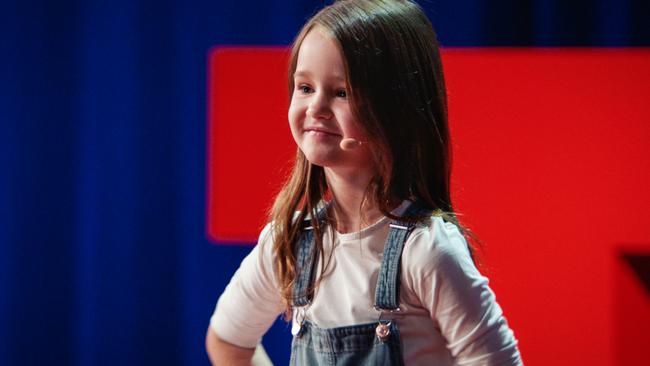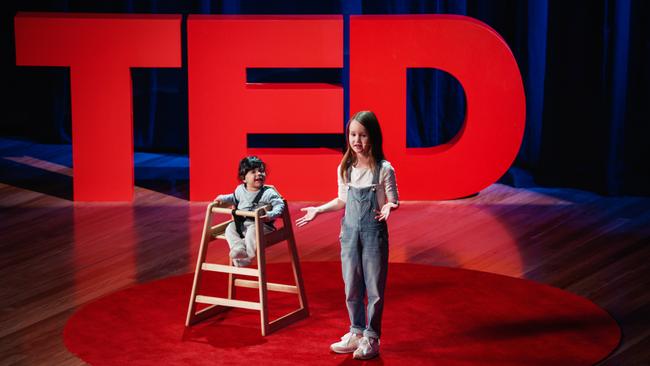OPINION: Young girl deserves a medal for putting spotlight on tech-addict parents
A seven-year-old girl should be applauded for calling out poor behaviour by adults who spend too much time on their phones, causing developmental damage to their kids, writes Kylie Lang.
Kylie Lang
Don't miss out on the headlines from Kylie Lang. Followed categories will be added to My News.
Shame on people who’ve mocked and criticised a seven-year-old girl for sharing an important message via the global speaking platform of TED.
Gold Coaster Molly Wright should be applauded for ramming home what few adults want to hear – that they should be more attentive to their kids and less hooked on their devices.

Having done a TedX talk myself, it takes a fair bit of courage to get up on stage in front of a huge crowd, knowing also your effort will be broadcast to the world via YouTube.
It is also true not everyone will agree with your message – these talks are designed to stimulate debate and prompt new ways of thinking, so dissent is inevitable.
But to have a crack at a child for respectfully challenging adults to do better is bad form.
Watching Molly in action, it’s clear she didn’t write her script. A seven-year-old is unlikely to be across neuroscience or deliver a seven-minute oration without coaching.
But so what? I say good on her – her parents and the Thrive by Five campaign backing Molly and now partnering with TED – for trying to make a difference.
Objectors who dislike being “lectured” or “told what to do” by a child are sadly missing the point.

The undisputed fact is that children today, particularly in the critical formative years of up to age five, are given patchy attention, or downright ignored, when mums and dads are stuck on their phones and other devices.
The quality of interaction with their child is poor and potentially damaging.
As Molly puts it: “Kids are hardwired to seek out meaningful connections … not receiving them creates confusion and stress.
“Our brains grow faster in the early years than at any other time in our lives … but we need your help.”
By connecting, talking and playing with children, we build stronger relationships and instil confidence and trust.
Failing to do this early and often can hinder a child’s behaviour going forward.
I wonder how many “brats” who act up in class and become violent – increasingly more frequently and increasingly younger, according to teachers – were neglected by parents busy on their devices and with other things considered more pressing.
In her TED talk, Molly shows a video experiment with her neighbour Amarjot and his infant, Ari. It demonstrates how when the father breaks play time, spending around 30 seconds checking his iPad, the baby becomes distressed.

This is not to say we must give our kids 24/7 attention or indulge them, but when we are physically with our children we should be emotionally present as well.
Scientists have proven the importance of “serve and return” communication, where interactions between parent and child go back and forth in what is also described as a “conversational duet”.
When those relational links are snapped – including by the lure of our devices – our kids are not getting the best of us.
What a wasted opportunity.
I recall outgoing Westpac boss Gail Kelly saying at an event I attended in Brisbane in 2014 that when she was on the sidelines of her children’s sporting games, she turned off her phone.
Being half a parent when the chance was to be a full one didn’t make sense.
Around 20 years ago technology expert Linda Stone warned of “continuous partial attention”.
For parents, this means modelling a primary relationship with devices and a lack of eye contact with people.

It is different from multi-tasking, Stone says, which is essentially a desire to be more productive thereby creating more time to relax.
Continuous partial attention comes from not wanting to miss something.
We are in a state of high alert, she says, attending to one primary task “at the same time scanning for other people, activities or opportunities, and replacing the primary task with something that seems, in this next moment, more important”.
I would argue – as would seven-year-old Molly, who says she is speaking for younger children yet able to articulate their feelings – that there is nothing more important than being present when you are present.
Kylie Lang is Associate Editor of The Courier-Mail
LOVE
Kids being taught earlier about positive body image. Starting in prep is not too soon. Well done to The Butterfly Foundation on the Australian-first program.
Queensland Olympic Council president and gold medallist Natalie Cook on Brisbane winning the games: “This is something that will permeate and infiltrate all corners of the state and the country. It will inspired people to be one step better than they were yesterday.”
LOATHE
Critics who slammed Annastacia Palaszczuk and Adrian Schrinner for travelling to Japan for the Olympics announcement. As the Premier and Lord Mayor, of course they needed to be there.
Girls school Moreton Bay College banning Year 11s from bringing a partner to their semi-formal. Prudish, and gender-biased when the affiliated boys’ school allows dates.



